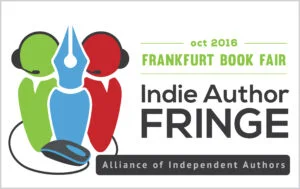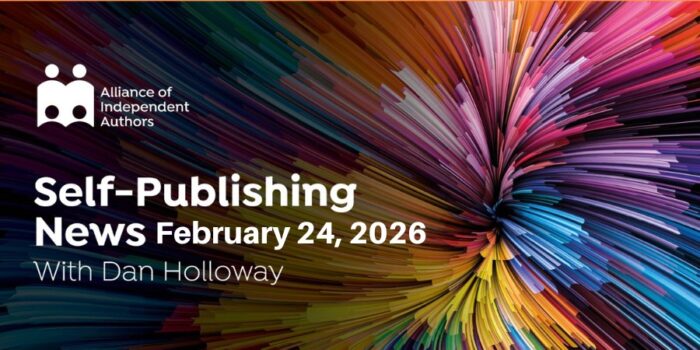
It's back to school week here in the UK. I was always ambivalent about this as a kid, because school meant leaving the safety of my own imagination in which I'd spent 6 weeks hiding. On the other hand, it meant new stationery. And as we know, for a writer new stationery delivers a more powerful hit than any drug yet cooked up in any lab. I have indulged very little in new stationery this year, but better than any new notebooks was the discovery that the two journals I thought I'd lost in the recent office fire have actually been salvaged from the water damage, complete with all the research I'd been using them for!
Indie Author Fringe
 It's that time again! Time for the wonderful travelling-yet-globally-present roadshow of indieness that is the Indie Author Fringe (IAF). This time round, IAF is scheduled to coincide with Frankfurt Book Fair, taking place on October 22nd. IAF will go live at 10am Frankfurt Time, and will be with you for 24 hours. The focus will be on Running an Indie Author Business and will as ever feature a great line up of speakers, whom you can see as they are unveiled here. Wherever you are on your journey, and wherever you are on the “why I do this” spectrum, there will be something there not to miss. There's also a competition to find the best website for indie authors – so get recommending your favourites.
It's that time again! Time for the wonderful travelling-yet-globally-present roadshow of indieness that is the Indie Author Fringe (IAF). This time round, IAF is scheduled to coincide with Frankfurt Book Fair, taking place on October 22nd. IAF will go live at 10am Frankfurt Time, and will be with you for 24 hours. The focus will be on Running an Indie Author Business and will as ever feature a great line up of speakers, whom you can see as they are unveiled here. Wherever you are on your journey, and wherever you are on the “why I do this” spectrum, there will be something there not to miss. There's also a competition to find the best website for indie authors – so get recommending your favourites.
Indie Author Fringe is delighted that its gold sponsor, Ingram Spark, is marking its sponsorship with a great deal that has just opened (just yesterday!) and runs to November 30th, waiving set-up fees for ebooks and print books, and free hardback set-up for existing titles. Visit the Ingram Spark sponsor page for full details.
Self-publishing in print: a major new report
 Talking of print books, the other really big news this week is the publication of a study that runs from 2010-2015 looking at the numbers of ISBNs registered for self-published print books in the USA. The study is run by Bowker, the USA's designated seller for ISBNs, and it shows some interesting trends (Publishing Perspectives has an interesting gloss on some). Some headline takeaways:
Talking of print books, the other really big news this week is the publication of a study that runs from 2010-2015 looking at the numbers of ISBNs registered for self-published print books in the USA. The study is run by Bowker, the USA's designated seller for ISBNs, and it shows some interesting trends (Publishing Perspectives has an interesting gloss on some). Some headline takeaways:
- It is no surprise that ISBNs for self-published print books are on the rise. What is interesting is that the rise has remained pretty consistent at between 30-40% year on year throughout the period of the study.
- Createspace absolutely dominates the picture, with over 80% of ISBNs being registered through them.
- Lulu are a big player, in second place with 10% of Createspace's figures, but the really interesting player rounding out the top 3 is Blurb, who have come from 0 in 2012 to over 31,000 in 2015. While I haven't got a breakdown on that number, that suggests to me that the kind of high end photo-memory-brochure book they specialise in represents a substantial chunk of self-publishing.
- There are figures for ebooks but, as one might expect, they are pretty much meaningless.
- There is a whole section devoted to Author Solutions. Numbers are down dramatically across Author Solutions imprints.
Withholding Tax on Kindle sales in India
As coverage in this column has made clear, India is a big growth market for self-publishing, and for Amazon especially. So this week's news that a Singapore affiliate is delivering Kindle content in India has potentially big implications. Specifically, unless you qualify for an exemption you will be liable to 10% Singapore withholding tax. There are some more details on the announcement but that includes the rather bald statement: “Authors located in the U.S. and India likely do not qualify for a reduced rate.”
And finally
If you have been anywhere near the internet this week, you won't have been able to avoid the consternation that has been caused by what's actually a simple enough rule of grammar. When describing something, just what order should you put your adjectives in? The rule is a very simple one. You order them thus – opinion-size-age-shape-colour-origin-purpose. But like the Monty Hall dilemma for amateur mathematicians, and the black/blue/gold/white dress for all of the internet, it seems every writer had an opinion (hopefully given before any other adjectives…) on this one.
I love to bring you exciting – or just interesting – tech. Well, this has the potential to be very exciting indeed – the development by a team of linguists at Oxford University of speech recognition software based on abstract features of language, which doesn't need to be trained, which works even with really thick accents, and in noisy environments – and can be adapted quickly for any language.
Upcoming Conferences and Events
SEPTEMBER 2016
Kentucky Women Writers Conference, Sept. 16–17 [Lexington] Triskele Lit Fest, Sept 17 [London] Word on the Street, Sept. 25 [Toronto, Canada] RomCon, Sept. 30–Oct. 1 [Denver] Chicago Writers Conference, Sept. 23-25 [Chicago]
OCTOBER 2016
Frankfurt Book Fair Indie Author Fringe, Oct. 12 [Online Conference] New Atlantic Independent Booksellers Association Fall Conference, Oct. 15-17 [Baltimore] Vancouver Writers Fest, Oct. 18-23 [Vancouver] Frankfurt Book Fair, Oct. 19–23 [Frankfurt, Germany] Frankfurt Indie Author Fringe Oct. 22 [online] Surrey International Writers Conference, Oct. 20-23 [Surrey, BC, Canada]
NOVEMBER 2016
Building Inclusivity in Publishing, Nov 15 [London]
JANUARY 2017
Digital Book World, Jan 17-19 [New York] All the week's top #selfpub news from @indieauthoralli for #indieauthors Share on X





[…] The Alliance of Independent Authors news update for Friday 9th September 2016: https://selfpublishingadvice.org/self-publishing-news-indie-author-fringe/ […]
[…] The Alliance of Independent Authors news update for Friday 9th September 2016: https://selfpublishingadvice.org/self-publishing-news-indie-author-fringe/ […]
Yes, I didn’t want to do a great long commentary on ebooks as that wasn’t the focus of the report -n Smashwords figures are broken out within the report, and make interesting reading (the decrease is interesting), but the figures seem to counteract your assertion that many more authors are using ISBNs – the “small publishers” line at the bottom, which mops up people putting out their books direct through stores has, in contradistinction to the 10% year on year rise with print, been falling for several years at around 10% year on year – which suggests to me that for that kind of writer, putting their work out direct (who would, looking at these figures – assuming that there are at least as many indie ebooks as print, appear to make up the vast majority), ISBNs are not being registered.
“There are figures for ebooks but, as one might expect, they are pretty much meaningless.”
Can you clarify that, Dan?
I know many indie authors using Amazon do not use ISBNs, but many more do, and the same goes for authors loading direct to Apple, Kobo, Nook, etc.
Pretty much every title put out through Draft2Digital, StreetLib, Smashwords, Ebook Partnership, etc, will carry an ISBN whether the author has their own or not, or is even aware of it.
Also worth bearing in mind that while pretty much everyone everywhere is loading ebooks to Amazon.com directly or through their local Kindle store store or through a local aggregator the Bowker numbers only represent those issued in the US,
Which means the Bowker figures, while not all-encompassing, are instructive as a minimum value..